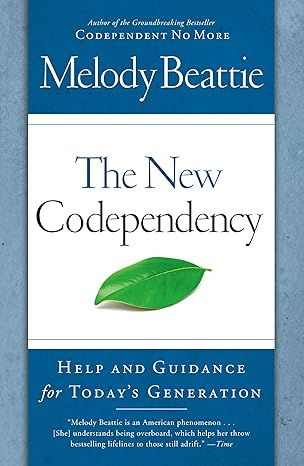The New Codependency: Help and Guidance for Today's Generation
4.6 out of 5
2,230 global ratings
The New Codependency is an owner’s manual to learning to be who you are and gives you the tools necessary to reclaim your life by renouncing unhealthy practices.
In Codependent No More, Melody Beattie introduced the world to the term codependency. Now a modern classic, this book established Beattie as a pioneer in self-help literature and endeared her to millions of readers who longed for healthier relationships. Twenty-five years later concepts such as self-care and setting boundaries have become entrenched in mainstream culture. Now Beattie has written a followup volume, The New Codependency, which clears up misconceptions about codependency, identifies how codependent behavior has changed, and provides a new generation with a road map to wellness.
The question remains: What is and what is not codependency? Beattie here reminds us that much of codependency is normal behavior. It’s about crossing lines. There are times we do too much, care too much, feel too little, or overly engage. Feeling resentment after giving is not the same as heartfelt generosity. Narcissism and self-love, enabling and nurturing, and controlling and setting boundaries are not interchangeable terms. In The New Codependency, Beattie explores these differences, effectively invoking her own inspiring story and those of others, to empower us to step out of the victim role forever. Codependency, she shows, is not an illness but rather a series of behaviors that once broken down and analyzed can be successfully combated.
Each section offers an overview of and a series of activities pertaining to a particular behavior—caretaking, controlling, manipulation, denial, repression, etc.—enabling us to personalize our own step-by-step guide to wellness. These sections, in conjunction with a series of tests allowing us to assess the level of our codependent behavior, demonstrate that while it may not seem possible now, we have the power to take care of ourselves, no matter what we are experiencing.
288 pages,
Kindle
Audiobook
Hardcover
Paperback
First published December 28, 2009
ISBN 9781439102145
About the authors
Melody Beattie
Melody Beattie is one of America’s most beloved self-help authors and a household name in addiction and recovery circles. Her international bestselling book, Codependent No More, introduced the world to the term “codependency” in 1986. Millions of readers have trusted Melody’s words of wisdom and guidance because she knows firsthand what they’re going through. In her lifetime, she has survived abandonment, kidnapping, sexual abuse, drug and alcohol addiction, divorce, and the death of a child. “Beattie understands being overboard, which helps her throw bestselling lifelines to those still adrift,” said Time Magazine.
Melody was born in St. Paul, Minnesota in 1948. Her father left home when she was a toddler, and she was raised by her mother. She was abducted by a stranger at age four. Although she was rescued the same day, the incident set the tone for a childhood of abuse, and she was sexually abused by a neighbor throughout her youth. Her mother turned a blind eye, just as she had denied the occurrence of abuse in her own past.
“My mother was a classic codependent,” Melody recalls. “If she had a migraine, she wouldn’t take an aspirin because she didn’t do drugs. She believed in suffering.” Unlike her mother, Melody was determined to self-medicate her emotional pain. Beattie began drinking at age 12, was a full-blown alcoholic by age 13, and a junkie by 18, even as she graduated from high school with honors. She ran with a crowd called “The Minnesota Mafia” who robbed pharmacies to get drugs. After several arrests, a judge mandated that she had to “go to treatment for as long as it takes or go to jail.”
Melody continued to score drugs in treatment until a spiritual epiphany transformed her. “I was on the lawn smoking dope when the world turned this purplish color. Everything looked connected—like a Monet painting. It wasn’t a hallucination; it was what the Big Book of Alcoholics Anonymous calls ‘a spiritual awakening.’ Until then, I’d felt entitled to use drugs. I finally realized that if I put half as much energy into doing the right thing as I had into doing wrong, I could do anything,” Beattie said.
After eight months of treatment, Melody left the hospital clean and sober, ready to take on new goals: helping others get sober, and getting married and having a family of her own. She married a former alcoholic who was also a prominent and respected counselor and had two children with him. Although she had stopped drinking and using drugs, she found herself sinking in despair. She discovered that her husband wasn’t sober; he’d been drinking and lying about it since before their marriage.
During her work with the spouses of addicts at a treatment center, she realized the problems that had led to her alcoholism were still there. Her pain wasn’t about her husband or his drinking; it was about her. There wasn’t a word for codependency yet. While Melody didn’t coin the term codependency, she became passionate about the subject. What was this thing we were doing to ourselves?
Driven into the ground financially by her husband’s alcoholism, Melody turned a life-long passion for writing into a career in journalism, writing about the issues that had consumed her for years. Her 24-year writing career has produced fifteen books published in twenty languages and hundreds of newspaper and magazine articles. She has been a frequent guest on many national television shows, including Oprah. She and her books continue to be featured regularly in national publications including Time, People, and most major periodicals around the world.
Although it almost destroyed her when her twelve-year-old son Shane died in a ski accident in 1991, eventually Melody picked up the pieces of her life again. “I wanted to die, but I kept waking up alive,” she says. She began skydiving, mountain-climbing, and teaching others what she’d learned about grief.
Read more
Reviews
Daisy S
5
The best Codependency Book I have read. My favorite Melody Beattie book! Very helpful and meaningful book!
Reviewed in the United States on February 18, 2015
Verified Purchase
Having read and benefited from several of Melody Beattie books I decided to purchase her newest book regarding Codependency. So glad that I did so. This book is so thought provoking and has been so enlightening for me!
After re-reading several of Melody Beattie books (Co-Dependent No More, Beyond Co-Dependency, Journey of the Heart, Language of Letting Go, and also Co-Dependent Guide to the Twelve Steps, I found this book to be her best work ever and below is why this is now my favorite Melody Beattie book:
-
Taking Care of Ourselves section - There is more information in this part of this book and more updated then her previous books. For example, in this beginning section, she shares some of her experiences. This sets the stage for more of how to take care of ones self that is explained more later into this book.
-
My favorite part of this book (most helpful one) is SECTION TWO ..The Evolving Art of Self Care. This part gives two steps to help right away with Co-Dependency - 1) Identify Teachers and Lessons Learned 2) Expressing Gratitude is a powerful practice She suggests writing a Gratitude Journal and it does work!
-
Also in Section Two is SETTING BOUNDARIES - This one has a checklist of how to set boundaries and how to set GOOD BOUNDARIES with people. This works in any type of relationship, with a partner, co-worker, friend, etc. This section has wonderful and to the point checklists that are easy to follow! And she even has a section on what Boundaries ARE NOT!
-
The section on Is it Love or Control? This explains the difference between normal love and compassion vs a controlling relationship. Ms Beattie used her own life experiences to explain examples of controlling and more.
-
The last section in this book called How To Find Help For Almost Anything - this is a must read section as it gives a number to call for help in all 50 states.
-
This book is updated and NO FLUFF, just meaningful reading in my opinion.
Highly recommend this book for anyone who wants to take better care of themselves whether in a relationship or not!
Read more
70 people found this helpful
Lauren Bastaparis
5
A new take on helpful ideas
Reviewed in the United States on January 11, 2012
Verified Purchase
I have always been a fan of Melody Beattie's work, and I have benefited enormously from it since the old days of Codependent No More. I have not been in a relationship with someone addicted, but I nevertheless recognized myself in the description of the Codependent. There were so many similarities: not being able to take care of myself, obsessing about other people, taking care of everyone's needs (apart from my own, that is), not having boundaries. I seemed to be a textbook codependent, except that I did not get involved with alcoholics. So I just went along with what she had to say and read several of her books.
The New Codependency is one of the best ones. It has all the usual qualities of her work:
*She uses an empowering tone: of course you can make it. And to be honest, when she describes her life of a former junkie, you cannot help thinking: well, if she managed to get out of this mess, Surely I can get out of mine. *Her book is packed with examples. The fact of the matter is, I can see problems and solutions so much more easily when I read about someone else. Examples allow me to do that. *There is a lot of practical, down to earth advice. I cannot count the number of books I've read which describe my dreadful problems, but then leave me there with a vague "well I guess you need therapy" chapter. I hate it. Don't talk to me about my issues if you are not able to offer one hint of advice on how to solve them.
In The New Codependency, Melody Beattie tackles important concepts she wrote about before (boundaries, taking care of oneself, deprivation, control...), but with a higher level of maturity . Because she does not go back to the basics, I would advise not to read this book without reading first her earlier work. If you have, then it provides additional hindsight and a wiser point of view.
There are also new ideas. She insists to de-stigmatize codependency, explaining that it is just "normal behaviours, plus", that it is just a stage of grief - and I must say I find this new idea really interesting. There is a chapter about nurturing that I liked - she did not write about it earlier because she did not know what it was. And there is a whole section about emotions that I found really useful - I am one of these folks who have difficulties simply feeling.
Read more
163 people found this helpful
Sharon Kay Peters
5
Co-dependency Updated!
Reviewed in the United States on April 30, 2024
Verified Purchase
Anything by Melody Beattie is GREAT! I like her explanation of co-dependency and not having to be in a relationship with an addict to benefit from this book. It helps you be emotionally balanced….which all of us need!😊💕
3 people found this helpful
Jeff
5
A look in the mirror
Reviewed in the United States on July 26, 2024
Verified Purchase
If you think you may need this book, then you do. I've listened on audible multiple times and have the book and workbook
JSmith
5
Love
Reviewed in the United States on October 9, 2017
Verified Purchase
It's ok to love someone who is addicted & cycles through mental issues. It doesn't make you sick. It makes you human, living in a world that's exceedingly tough for some souls, bodies & chemistries. What does make you sick is stalling your own dreams & plans to be their solid. What does make you sick is rescuing, being attached to an outcome with this person, or relying on them for your self worth. Only you can do that. And sometimes the most helpful thing is to say no. No to paying for things because that enables their poverty. No to staying up late with them because that enables their anxiety and increases yours. No to picking up the substances, let them get their own. You can't control the illness, the cycle, the addictions, their pain, or their decisions. But you can take care of yourself. And in healing, you can communicate with them in a respectful, loving, adult way that sets the bar higher for both of you. You can leave at anytime, so remember that this is a choice your soul made for growth, and not a life sentence. Take the beautiful parts and learn to smile at and let go of the crazy. Extract yourself from the parts that make your heart race or jump. This isn't about you. It's about them. Codependency is a simple case of mistaken identity.
Read more
268 people found this helpful
Lesli Mitchell LCSW
5
Loved it
Reviewed in the United States on March 29, 2023
Verified Purchase
What a beautiful book so helpful on so many levels. I am a therapist and I truly appreciate it the down to earth, direct concepts in this book. I plan on using many of the activities in this book and some of the general concepts as well with my clients.
5 people found this helpful
Christine Moers
4
This was not what I was expecting
Reviewed in the United States on March 8, 2014
Verified Purchase
As I started to really evaluate my life, my relationships and my parenting tendencies, I came across the word "codependency." I did not realize codependency happened outside of addiction. I had so much to learn!
Beattie's book ripped me wide open. It was a fast read, if you didn't need to slow down and catch your breath ... reevaluate your life with every turn of the page. There were plenty of areas I did not identify with. However, the areas that reflected myself back to me forced me to see my intentions in a brand new light. This book was a big catalyst of change in my life. I finished it feeling empowered as well as humbled.
I do too much for people. I give myself away too much. I have learned how to stop doing that and still find rich fulfillment in my life. I have been practicing self-care, as well as allowing others to take care of themselves unless I'm invited into their life to help.
I gave the book four stars, because I feel it is the perfect companion to "Codependent No More." I wish the two could be combined into one piece. That would fulfill my five star rating. If you can only read one, I would choose "The New Codependency."
Read more
27 people found this helpful
Iliya Khramov
4
Important, Good, not Great
Reviewed in the United States on June 16, 2019
Verified Purchase
So, if you are familiar with Codependence you know that Melody Beattie's book will be important and contain excellent information. If you are new, then definitely consider ANY of her books to get a better understanding. Some are better and more clear than this. This book is probably not the best for a total beginner. The writing is a bit all over the place and not that well organized. All the information is there, it's just a little bit scattered and written in a mildly confusing way but if you know the language of codependence you will get all the info and advice you need. So five stars for content and helpfulness, 4 stars for style of presentation. STRONGLY recommend you read it more than one time and find what works for you. Oops, there I go, "helping" total strangers get the best use out of this book. And now I know I really needed it, LOL. You might too, give it an open minded reading and see if it will make your life better. Peace
Read more
112 people found this helpful
Gabriela D.
3
Great book. Bad printing.
Reviewed in the United States on July 1, 2023
Verified Purchase
Book is great. A few pages double printed like in the picture, some are ok but other pages are really difficult to read.
DeeDee
1
Not a fan at all...
Reviewed in the United States on March 26, 2024
Verified Purchase
I don't know if it's the over saturation of mental health and self-development pushed out and overplayed in the world and media or it's the never-ending rambling of this book that turns me off of it but I'm having a hard to digesting and BELIEVING some of the concepts in this book.
The concept that really put me off was "Surrendering Our Way Into Grace: Trusting God, Life, Others and Ourselves". My issue isn't with God as at least that word comes interchangeably but my issue is with Others. This contradicts her antidote about a mom whose 6 year old daughter was sexually assaulted by a 17 year old boy who was hired as a baby sitter but was not made public he was a sex offender. "Trusting others" is what usually gets addicts and non-addicts dealing with codependent behavior in trouble in the first place. Having DISCERNMENT and developing discernment is the proper concept that should be pushed rather than "Trusting Others".
The other issue or concept that really didn't make sense was the "Sexual Intimacy and Codependency" part of the book. She basically lists ALL the different ways PEOPLE can experience (or not) sex and sexual intimacy/relationships with others and then refers to this as a "side effect" of being codependent. Huh? Thanks for outlining what we already know about different people and then attributing that all to codependency and trauma or being disconnected from our body. It's partly how different people exist. She assumes "cause and effect" correlations where they don't exist and at risk of leaving something out she just lists every known variation.
And last, I can't find it but I catch glimpses of her mentioning divorcing a second time without finding the complete story or understanding why it's relevant to mention. Like it's missing why she keeps bringing it up as something to reference or learn from or understand with the author. I'm guessing because she was still operating with codependent behavior she had to break away to heal. Wish there was more of a cohesive thought paragraph or chapter on this but maybe it's not in this book.
I'm having a hard time why this concept of Co-dependency even matters anymore. This book has made me think that life is short and if I spend all of my time in this book and trying to live out it's foggy principles I might just look up and my life is over. Maybe I've researched too much about it at this point but this book didn't add anything to my understanding and instead made me consider a lot of irrelevant information.
Read more
Top Melody Beattie titles
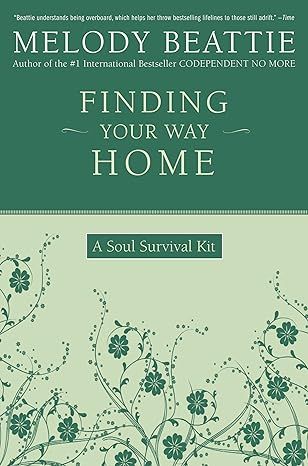
Finding Your Way Home: A Soul Survival Kit
4.6
-
462
$10.29
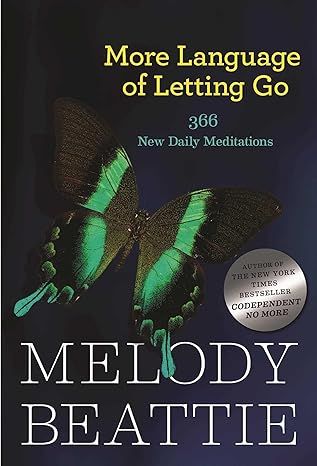
More Language of Letting Go: 366 New Daily Meditations (Hazelden Meditation Series)
4.7
-
1,292
$0.99
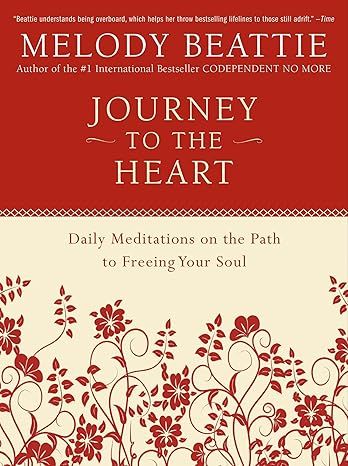
Journey to the Heart: Daily Meditations on the Path to Freeing Your Soul
4.8
-
4,646
$0.99
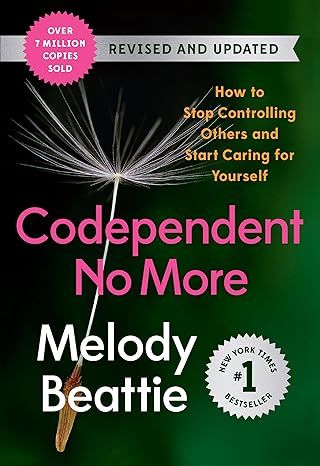
Codependent No More: How to Stop Controlling Others and Start Caring for Yourself (Revised and Updated)
4.7
-
18,074
$0.99
Best Sellers

The Tuscan Child
4.2
-
100,022
$8.39

The Thursday Murder Club: A Novel (A Thursday Murder Club Mystery)
4.3
-
155,575
$6.33

Sapiens: A Brief History of Humankind
4.6
-
140,302
$13.49

The Butterfly Garden (The Collector, 1)
4.3
-
88,556
$9.59

Things We Hide from the Light (Knockemout Series, 2)
4.4
-
94,890
$11.66

The Last Thing He Told Me: A Novel
4.3
-
154,085
$2.99

The Perfect Marriage: A Completely Gripping Psychological Suspense
4.3
-
143,196
$9.47

The Coworker
4.1
-
80,003
$13.48

First Lie Wins: A Novel (Random House Large Print)
4.3
-
54,062
$14.99

Mile High (Windy City Series Book 1)
4.4
-
59,745
$16.19

Layla
4.2
-
107,613
$8.99

The Locked Door
4.4
-
94,673
$8.53
